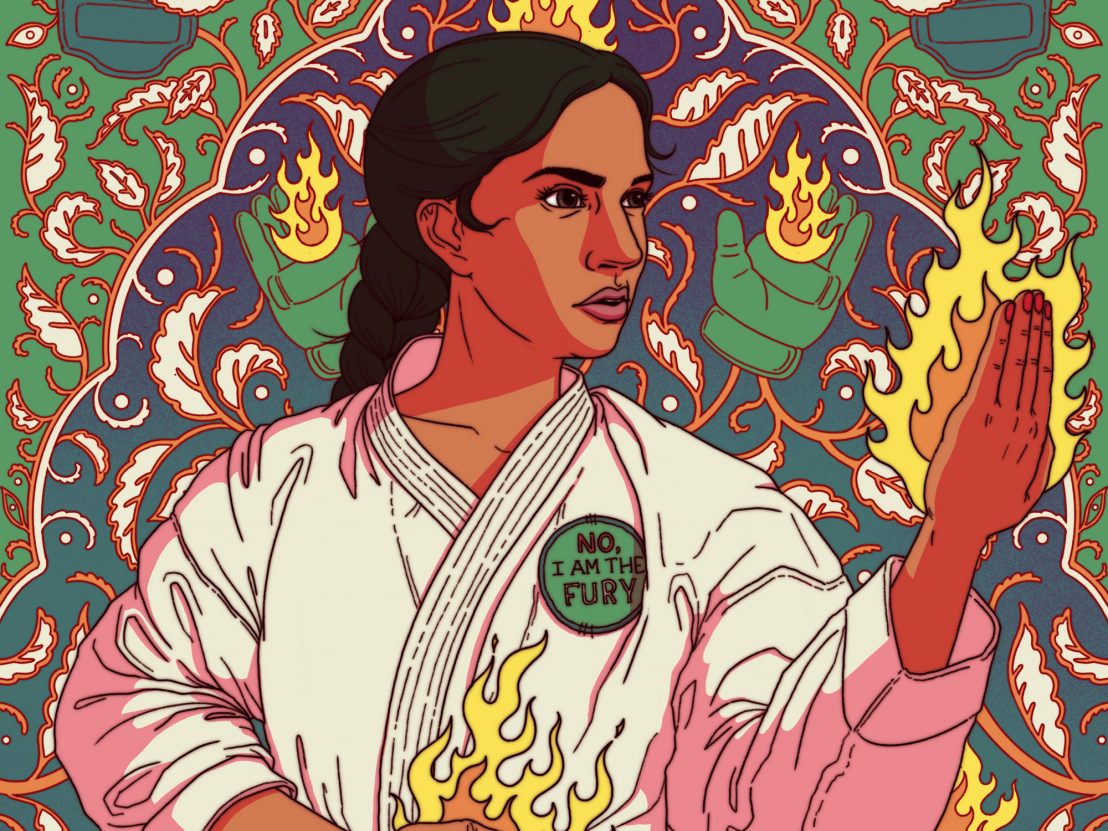
Priya Kansara talks the epic prep required to play the lead role of a teen stuntwoman-in-the-making in Nida Manzoor's Polite Society.
If you take a peek at Priya Kansara’s acting CV, you’ll currently only see a couple of credits: three short films; small roles in two Netflix series; and now, the lead role in Nida Manzoor’s Polite Society. An actress very much at the beginning of what promises to be a storied career, Kansara studied science at university and was working in healthcare communications prior to making the giant leap towards performance.
She studied acting at the Identity School, which was founded by Femi Oguns in 2003 and counts John Boyega and Letitia Wright among its alumni. After auditioning for a different part in Manzoor’s debut feature, Kansara impressed the team so much she was asked to read for the lead. She announces herself in dramatic and comic style with Polite Society and brings an infectious, sunny energy and wilfulness to the character of Ria, who must contend with disapproving parents and her sister’s shifty new fiancé, all while trying to pursue her goal of becoming a world-famous stuntwoman.
LWLies: Polite Society is inspired by Nida Manzoor’s own childhood, but it also has a resonance with you, as you always wanted to be an actress but were doing something completely different until fairly recently. Was that personal connection to the material what drew you to the role?
Kansara: Yes, it’s definitely one of the reasons. There’s a scene towards the beginning of the film, where we are sitting the dinner table and Ria says to her family, ‘I’m going to be a stunt woman,’ and I had flashbacks of sitting at the dinner table in my family home and telling my parents I was gonna gonna quit my job and be an actress. They said, ‘Are you sure about that? Do you want to book a job first?’ And I kept saying ‘It’s gonna be fine!’ You could have asked me when I was four-years-old, and I would have told you I wanted to be an actress. It’s the one thing that I’ve always been determined to keep up in my life, so I really related to Ria’s determination to do the thing that she has always wanted to do. Perhaps one of the things that I love about her is that she’s brave enough to try and pursue it on a larger scale at a younger age. I was very drawn to her as a character, but also the fact that this really is just a love story between two sisters was something that really spoke to me.
Do you have any siblings?
I have a younger brother, but I also have a lot of very big extended family and I’m very close to two of my cousins who are sisters and near to me in age, so I’ve grown up feeling like I have a lot of siblings. I remember reading the script for the first time and I felt like I’d seen this relationship my whole life, even down to the nicknames Ria and Lena have for each other. I felt so instantly connected.
You mentioned that you’ve wanted to act since you were very young – were there any particular actors who inspired you?
No one in particular, but my mum was big on Bollywood movies, so I used to watch a lot of Indian cinema, and my dad loves action. James Bond, Mission Impossible and Die Hard – you name it. I was probably too young to be watching that kind of thing, but it was always on the TV, and something that attracted me is that cinema is a form of escapism, with all these alternative worlds to get lost in, and I found that very inspiring. I think more than a particular film or person, it was my love of performance that motivated me.
As a British-Indian actress, how much did your perceptions of the industry’s relationship with race in this country impact your journey?
You don’t see a lot of yourself on screen or on stage and I think that’s why I didn’t take the traditional route as an actress. I didn’t study acting full-time, because I just didn’t know if I could do it – if there was the space for me. For me, I was always acting as a hobby, and I’m so thankful my family and my friends were all so supportive of me doing it – taking me to musical theatre clubs, or coming to see me perform at drama club.
At university I spent all of my free time doing as many shows as I possibly could. That was my outlet, and that was the way that I kept it alive for myself, and by the time I graduated, I’d started to hear of and see more people like me doing it. I felt I had to take that risk. So, I was working in healthcare communications during the day, and in the evening, I would do drama school at the Identity School of Acting. I wouldn’t necessarily recommend that to everyone because it is spreading yourself very, very thin. But to me it was the sacrifice that I was going to make to do what I loved – it was something I had to do.
What do you feel the experience of attending Identity gave you?
Just to be open, be curious and to strive for excellence. We don’t strive for an outcome, we strive to be good at what we do. Being in that environment really confirmed my belief in myself and that acting is something I wanted to do. It doesn’t work the same as a full-time school, so I wasn’t able to take as deep of a dive into certain techniques and acting styles and processes, but I gained such a solid understanding of what is out there, what tools I could use, what I could look into later. I also learned so much from my peers as well, and how we work together and as an ensemble. This industry is so full of so many variables – ultimately 99 per cent of my job is not in my hands, and I only have control over my ability. So that is what I’m going to invest my time in. And the rest hopefully will come.
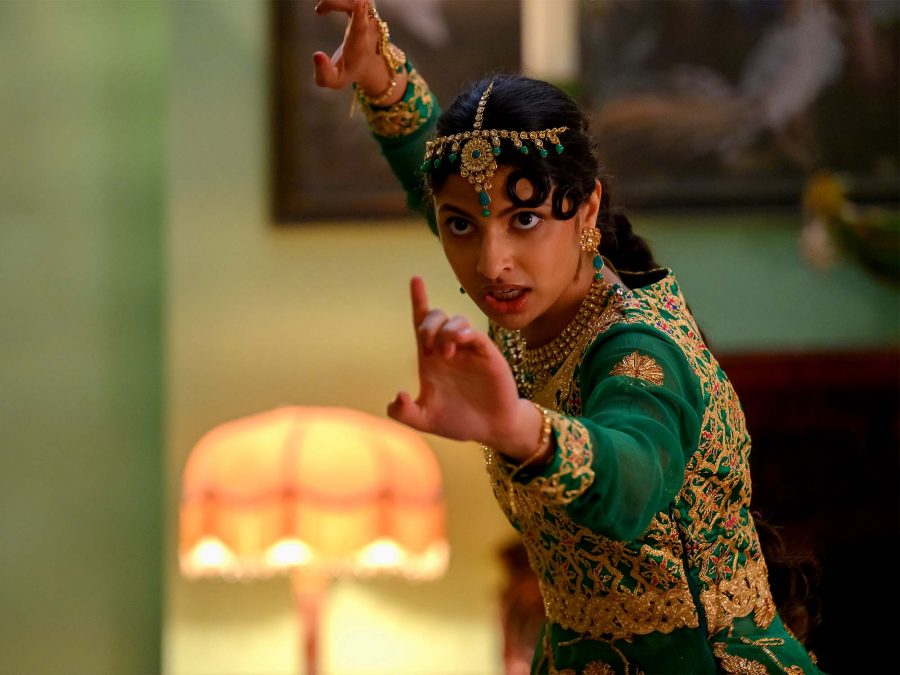
You give an incredible comedic performance as Ria – is comedy something you were always drawn to?
I’m gonna be honest with you, I never thought that I’d be a comedic actor. I assumed I’d be awful at it. At drama school we often focus on dramatic work and I think that’s what people like to do more. But you have to treat comedy the same as any other role, and be true to the character. Ria is somebody who is laughed at more than she is laughed with, because she just seems crazy to everybody else. Of course, Nida is such an incredible writer, and I also feel with this film so much of the comedy is in the edit. There’s almost like an Edgar Wright-style of direction when it comes to comedy, and I know he’s one of Nida’s inspirations, which I think is reflected in this movie.
Speaking of Nida, this is her first feature film. What was it like for you to take that journey together?
One of the things I admire so much about Nida is that not only is she a great writer and director, she is the epitome of an excellent and a true collaborator. She knows what her vision is and what she wants to achieve, but she brings together an incredible team of people to make that happen. Many of the Polite Society team worked with her on We Are Lady Parts, and she brings together people that are also just as collaborative as she is, who can not only see her vision, but are able to add to it. For many people it can take years to be able to develop that skill, so to be able to create that environment at such an early point in her career is a true testament to her talent and personality.
Stunt work is a huge part of this film as it’s a huge part of Ria’s personality. How intense was that to pick up?
I’d only ever done a couple of classes about stage combat – I’ve never done any martial arts or any fighting with stunt training ever in my life. We had an incredible stunt team and I could list a million names that helped in this process. They are the reason why I was able to do so many of my own stunts, they so carefully taught me everything, but also were able to empower me through that process and build my confidence. It was important to me because it’s such a huge part of Ria.
Being able to do this every day was like getting into her body, understanding her physically and understanding her passion, but also so many of the fights are character-driven – like when the sisters fight, it was important to acknowledge that Lena is actually more skilled, and Ria learned a lot from her sister. So obviously her sister’s gonna kick her ass. But Ria does put up a fight, and she doesn’t stop. There was also this sense of building in her confidence level in these fights, because she’s not an expert. She’s still training to be a stunt woman. The fact that I was learning the stunts as we were doing the film was really cool, because I’m not perfect, but that’s very reflective of where Ria is with her stunt training in the story.
Published 27 Apr 2023
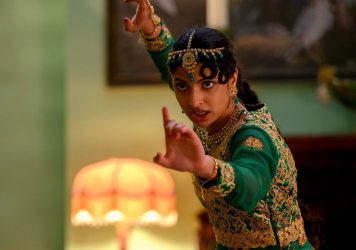
Following the blast of sitcom joy that was We Are Lady Parts, Nida Manzoor takes a giant leap to the big screen with an in-your-face comedy about crane-kicking the face of traditional mores.
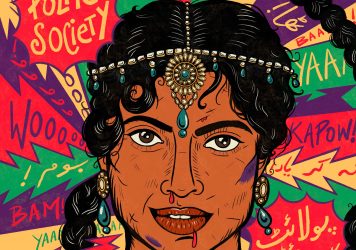
Discover our new issue dedicated to Nida Manzoor’s heiney-kicking comedy about the life of an aspiring South Asian stuntwoman.
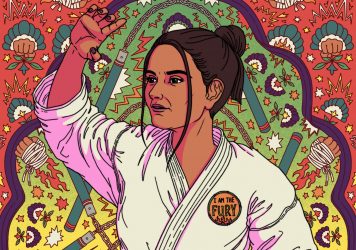
By Soma Ghosh
The writer-director behind the furious, hilarious Polite Society explains how her teenage years inspired her to create a coming-of-age action-comedy for the ages.